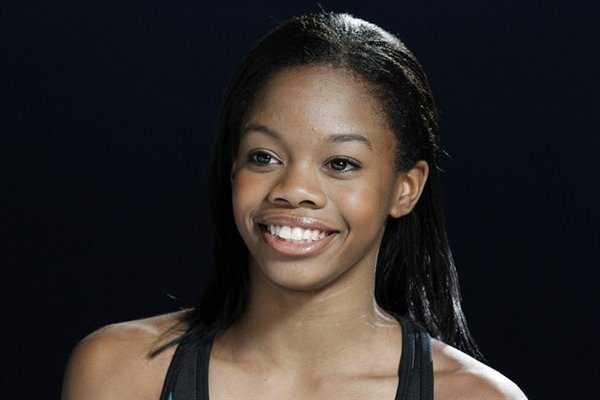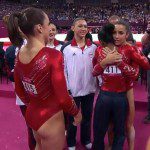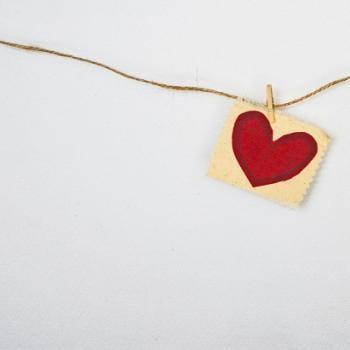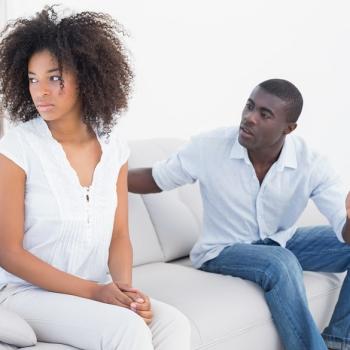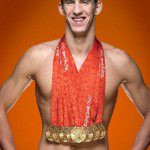Gabby Douglas won the all-around title at the London Olympics today, becoming the most recent American women’s gymnastics champion in the line of Mary Lou Retton, Carly Patterson and Nastia Liukin. What sets Gabby Douglas apart, of course, aside from the fact that she is simply her own gymnast and a different human being, is that Gabby Douglas is African American.
I never perceived gymnastics to be a racist sport. It was, however, predominantly white. My best friends in the gymnastics world, as a junior, were African American, Chinese American, Chinese American, and Korean American. My college team was white, Jewish, Asian American, and black (Jair Lynch continued to train with the team at Stanford even though he was past his NCAA years). So my personal circle, there in the San Francisco Bay Area, was quite diverse. As a general rule, however, American gymnastics is largely white and, to a lesser extent, Asian American. My black teammate in my junior years, Israel (Izy) Mlay, was (to my knowledge) never treated any differently than anyone else. But he was one of the few African Americans wherever we went.
The reasons are largely circumstantial. African American culture tends to emphasize other sports; gymnastics is expensive and time-consuming and upscale white suburbanites seem more likely to enter; and there simply haven’t been many role models to lead African Americans into the sport. As I wrote several days ago, if Gabby Douglas won, it could be a Tiger Woods moment for gymnastics. Tiger reached new levels of dominance in the sport of golf — but he also made it cool for African Americans to enter the sport. Golf was no longer seen as a sport for rich pot-bellied men with grey hair at the temples. It was for young, hip, muscular men of all colors, men who might just as well play basketball or baseball but who chose to play golf because golf was, well, cool.
My friend Kim (Hamilton) Anthony helped to pave the way for Dominique Dawes — who competed in three Olympics for the United States — and now Gabby Douglas. Kim, who came from a drug-ravaged family and neighborhood, spent her days practicing in the gym and her nights cleaning the gym and running a coat check stand at a night club, in order to pay for her training. Like Anthony is now, Gabby Douglas is a Christian who seeks to bring glory to the God who gave her athletic gifts.
I interviewed Kim a few years ago:
*

You faced profound challenges few gymnasts face. How did race and class play into your experience as a gymnast?
I was living in two different worlds, and it wreaked havoc on my identity. At home I lived in a predominantly African-American environment. I went to a public school that was predominantly African-American, and the people I hung around were in the same socioeconomic status I was.
In the gym, it was the opposite. I had a hard time figuring out where I fit in. In practice, I spoke English correctly. To this day, I remember how embarrassed I was when a boy on the gymnastics team corrected my English, because I did everything I could to fit in and be exactly like everyone else.
Since we could not afford my training, we raised money in unconventional ways. My parents and I cleaned the gym after practice at night, or very early in the morning, before we left for work and school. I performed gymnastics at a nightclub. We would set up a coat check stand and people paid a dollar or two to check their coats and hats, and I performed under the disco ball after midnight, to show them where their money was going. I entered talent contests and did gymnastics routines to win money to pay for my leotards or travel expenses or training.
While my teammates were in their beds all warm and cozy, I was walking the street at four o’clock in the morning, returning from the nightclub where I had been raising money for my training. On other nights, I would work out until ten o’clock, and then sometimes we would clean the gym right after practice. But if we were too tired, then we would wake up to clean it at five in the morning on the next day. So my experience as a gymnast was quite different, but I never shared those things with my teammates. I didn’t want there to be just another thing that separated us.
I was also in an environment surrounded by drugs. There was a lot going on.
I imagine that the drugs created even more of a tension between your setting in the gym and your setting at home.
Here’s a story I didn’t share in the book. I remember one of my teammates coming over to play on a Saturday after practice. We just did what girls do. We played around and had fun for a couple hours. Then my father came home with his friends, and they were about to do what they usually did. I remember being so embarrassed because I thought that they would do their drugs while she was in the house. I didn’t want that to happen, so I begged my mother to ask daddy to wait until after this girl leaves before they start doing that, because I would be so embarrassed. That was one of the struggles that I had.
We grew marijuana in the house as though it was a houseplant. So when a gymnast came over, I would pray that they wouldn’t recognize what kind of plants those were. They never did.
It was rough for me. On the one hand, I was trying to hide this other life from my teammates. On the other hand, if I used proper English around my cousins or other family members, they would make fun of me and say that I was trying to be white. Here I am, this little black girl, and I didn’t fit in socially at the gym. Yet I didn’t fit into the environment I was growing up around, either, because I was a gymnast and I had been exposed to things others hadn’t been exposed to. It was a difficult time for me.
Do you feel that gymnastics broadened your horizons? Did it give you a larger sense of life’s possibilities? In that sense, do you think gymnastics helped you out of a setting of drugs and violence?
Yes, absolutely. I know that God used gymnastics to save me. Gymnastics saved me from a lot of madness and mess. I have people I went to school with who are dead now, or who are strung out on drugs, or who are on welfare having multiple children to collect more welfare. Had I not had gymnastics practice to go to, to keep me out of that environment, that would have been me. I am sure of it…I think gymnastics just did wonders, especially in terms of exposing me to the lifestyles of other people. I look back and I am thankful that God had me traveling the world while I was young, had me staying in the homes of people who had different types of careers. I saw that there was more to life than my city block.
You can read the rest of the interview here. Congratulations to Kim Hamilton Anthony and Dominique Dawes for helping to make this moment possible by blazing the trail for the likes of Gabby Douglas. And congratulations especially to Gabby Douglas for her extraordinary performance. Here’s hoping that many thousands of African American girls follow her into the sport.

